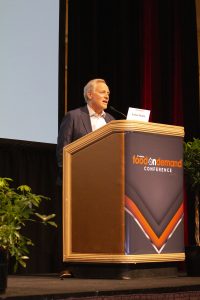For the first time, this year’s Food On Demand Conference included a panel of high-profile restaurant tech investors who opened their playbooks to share what they’re watching at this pivotal convergence of automation, innovation, convenience and challenges driven by supply chain and climate change.

Moderator and early-stage tech investor Andy Peskoe
Moderated by early-stage tech investor Andy Peskoe, who is chairman of the Golenbock law firm and co-head of its corporate and food, beverage and hospitality practice groups, he was joined by a roster of investors focused on helping operators solve tangible problems, bolster the people side of their businesses, bring automation into the industry and connect agriculture to the first- and last-mile logistics chains.
Mark Leavitt, managing partner of Enlightened Hospitality Investments, was flanked by Buck Jordan, co-founder and CEO of Wavemaker Labs and founder of Miso Robotics, Julie Zucker, CMO of Branded Strategic Hospitality and Brita Rosenheim, partner at Culterra Capital.
Opening the session by saying, “We’re at a moment where we’re all profit-minded about what we do, we’re struggling to feed the world, struggling to deal with climate-change issues and to bring equity to bring nutrition … with war disrupting one-third of key foodstuffs,” Peskoe set the tone, noting that half of the money invested in the industry is still going to protein alternatives, even with so much world-changing potential beyond just replicating meat.
Leavitt, affiliated with Danny Meyer’s Union Square Hospitality Group, said his firm just raised a second fund that, at $330 million, is 50 percent larger than its first. With half of the second fund focused on technology—both for consumers and operators—his team remains trained on the idea that hospitality will remain a key differentiator and that “nice guys can finish first.”
“We focus on diversity in the types of investments and also with the teams working at the companies we back and with our own investment team,” Leavitt added. “Half of them have female founders or CEOs and 70 percent of the companies in our portfolio have female founders or diverse founders … we think that’s a really key component to success.”
Calling his company a “horse of a different color,” Jordan called Wavemaker Labs a holding company that’s more than a fund, with a focus on automating food assembly in the back of the house and agricultural sides of the restaurant business. At present, that includes automated apple picking that could have a huge future, he said, with the assumption that farm-based labor could increase by 50 percent within the next five years.
“We love robotics,” he said. “We used to be a generalist VC fund investing in other peoples’ ideas. Now, we don’t take pitches, we take problems from corporations and build companies around those problems. The best investments always come from really huge problems in large markets.”
Stressing that Branded Strategic Hospitality has evolved from a restaurant group to an investment fund, Zucker’s team invests in early-stage hospitality startups that are solving issues that are top of mind for today’s restaurant operators.
“Our goal is what is affecting operators today, what are the hardships?” she said. “We’re looking for companies who are checking off the boxes on helping operators streamline their business and help their bottom line,” adding that the company has a pipeline with more than 100 companies at present.
At Culterra Capital, Rosenheim has been focused on the food sector for the last 10 years, and is launching a new fund this year that is currently in the pre-marketing stage. Over the last decade, and especially during the last two years, the adoption of technology has transformed where the opps are in the food sector.
“Unlike the other panelists here, my lens goes all the way up the supply chain, which wasn’t possible five years ago,” she said. “There weren’t many tech solutions … [and] the most interesting thing to me is connecting the tail end of the food system up to the last mile.”
With so many restaurant and delivery operators focused on the last mile of delivery, her version of that involves thinking about the end of the agricultural chain, and thinking of the product journeys all the way to a customer’s door with a goal of reducing food waste and improving freshness.
Funding with a soul
With EHI’s focus on people, Leavitt said he and his team can quickly tell which companies prioritize their employees, including management teams that will “wheel out their senior teams but not really want them to speak.” Those situations, he added, are clear indicators of companies that lack a focus on innovation and personal empowerment.
He also called out his fund’s investment in Goldbelly, which grew significantly during the pandemic and, in his eyes, “resonated by striking a chord about what hospitality really mean post-pandemic.”
Jordan echoed a similar sentiment, saying that when his company makes an investment “I want to make sure the company has a mission statement” because “companies that don’t have missions should be destroyed, otherwise what are you doing?” Those missions, he said, motivate people and reduce churn, aside from achieving goals larger than quarter earnings.
With the amount of food that Americans waste each year, exacerbated by the fundamental nature of delivery and takeout, Zucker said Branded Strategic is also focused on the packaging side of the business and finding ways to tie those benefits to increased sales, reduced expenses and possibly also tax credits.
“Of course, everyone wants to do good, but it’s also really nice to have operators understand how they can do good and save on cost,” she said.


